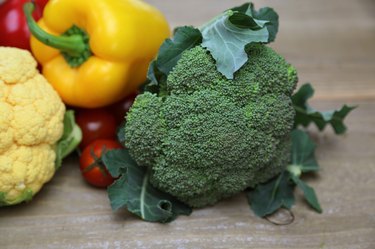
While vegetables can be a way to incorporate fiber and a low-calorie food source into your daily diet, some vegetables come with an unwanted symptom: bloating. Vegetables can especially contribute to bloating because they contain carbohydrates, which break down as sugars. One example is raffinose, which is found in vegetables like cabbage, Brussels sprouts, broccoli and asparagus. If you experience bloating related to vegetable consumption, take action to reduce your symptoms. However, if the symptoms do not subside with time, see your physician.
Step 1
Identify vegetables in your diet known to cause bloating. Common vegetables that contribute to bloating include beets, broccoli, Brussels sprouts, cabbage, cauliflower, corn, cucumbers, leeks, lettuce, onions, parsley and sweet peppers. If you consistently experience bloating after eating one or more of these foods, consume it in limited quantities; eliminate it from your diet altogether if its effects are pronounced.
Video of the Day
Step 2
Slow the pace at which you eat your vegetables. Eating too quickly and inhaling excess air in the process can contribute to the bloating that's related to vegetable consumption. Instead, slow down and take your time as you are eating to reduce bloating.
Step 3
Increase your vegetable intake slowly. When you add numerous vegetable servings to your diet all at once, you are more likely to experience bloating because your body is unaccustomed to a higher amount of fiber. By slowly adding vegetable servings to your daily diet, your body can become better accustomed to breaking the vegetables down.
Step 4
Take a digestive enzyme supplement designed to help you digest carbohydrates found in vegetables. Natalie Egan, M.S., R.D., L.D.N. recommends Beano, which is designed to reduce bloating related to vegetable and bean consumption. You also can take a product that contains simethicone, which helps to reduce gas bubbles that contribute to bloating.
Step 5
Take a walk after you finish eating. When you do not move enough, gas can build up in your intestines and contribute to bloating. Movements can help to free trapped gas and reduce vegetable-related bloating.
Warning
In some instances, bloating related to vegetables can indicate the presence of an underlying condition like inflammatory bowel disorder. If your bloating is accompanied by abdominal pain and occasional diarrhea, see your physician.
Video of the Day